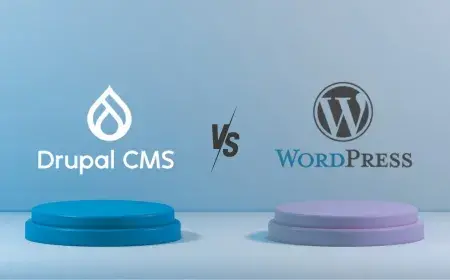Have you had enough of hearing and reading about cutting-edge Drupal's innovative features? About all the improvements that its developers have implemented to this version of Drupal? About its:
- unmatched functionality
- about how it can upload files a top speed
- about how it comes equipped with cool multilingual add-ons
- about the truly innovative mobile-first mentality that it embeds
- and about its goal to cut out the middlemen and empowering the end user even more?
About extended control, put in the hands of developers, builders, content editors and site admins?
And now you want some of all that, too, right?
You want to gain such control over your own site, as well, to supercharge it with such power and to get it aligned not just with the present-day digital trends, but to those of the future, as well. Those that Drupal 8's developers have already anticipated?
Then go ahead! But, before you upgrade to Drupal 8, take some time to go through our set of 6 tips on how to get your site properly prepared for this significant upgrade
Preparation is key for a smooth and effective upgrade to Drupal 8, you know!
1. Before You Upgrade to Drupal 8: Audit Your Current Site
No business/website owner “worth his salt” could possibly have high hopes from upgrading his website if he skips this major step!
How could you project its evolution if you're clueless (or have just a vague idea) of where it's standing right now, from a technical standpoint?
So, before you rush in to install all those “uber cool”, feature-rich Druipal 8 modules on your website, you'd better start building the rock solid foundation of your future Drupal 8 website. Open a forever reliable Google doc. and start filling it up!
Start examining your current website and write down the answers to a couple of key questions:
- What sections of your current site do you use most frequently?
- What sections of your site are barely ever used?
- Is your current administrative interface user friendly enough?
- Are there any broken links or inefficient workflows on your site?
Write down everything that you find relevant in your Google doc., ranging from those aspects/workflows on your website that you won't give up to, to all the challenges that you're facing as you're closely auditing it, thoroughly.
Don't forget to write down all your migration-related expectations, as well!
As you and your team will have your moments of inspiration and will “burst” with new innovative ideas that you could implement on your site, make sure to write them down in this soon to become your priceless resource: your Google doc.
You may not realize it now, but this document “locking in” all the key aspects of your current website will be “pure gold” once you delve deeper and deeper into all the other stages of this site preparation for migration process!
2. Keep It Under Version Control
Sometimes it's Drupal's innovative nature itself that could turn into its own weak point!
The “empowering the user” goal, aimed at turning the whole configuration changes into a matter of point and click could also turn breaking up a site into a matter of just a few seconds.
Good news: through its Configuration Management Interface (CMI) Drupal 8 promises to put this possible scenario away for good!
What you can do, for avoiding such an unwanted scenario to happen, is to capture updates via code and to roll them into your production site. Rely on version control and on Drupal 7's Features and Configuration Management modules.
Implementing such a good practice will automatically guarantee you a more streamlined Drupal 8 workflow and a “safety-net” if something wrong happens: you can always roll back those trouble-making changes.
Ever-so-useful practices, like this one, will always watch your back!
3. Re-organize Your Team: Set Up a Modular Workflow
Preparing your team, as well, and not just your current website, is another crucial step of this whole “preparing to upgrade to Drupal 8” process!
Drupal 8's own distinct nature (compared to other versions of Drupal) calls for a far more scalable, modular approach to its CMS design and content authoring.
Therefore your team, as well, should be structured differently.
This calls for a different type of workflow! One where each team's leader gets assigned to coordinate it, to make sure the overall vision gets properly implemented, while each member of the team gets manageable tasks (one class file per developer, for instance).
Separate implementations, several distinct tasks assigned to each team member will put together the Drupal 8's specific workflow: a much more scalable, easy to handle and therefore efficient one.
With each member of your team focusing on a specific part of the project and a leader coordinating the whole team, they'll get to respond to any occurring challenges in a far more promptly manner!
4. Audit Your Current Modules, One by One
With your team now ready to enjoy all the advantages and to handle all the challenges of Drupal 8-specific modular and scalable workflow, it's time to run an audit on your modules, as well!
It's crucial that you have everything, at the modules' level, up to date, before you upgrade to Drupal 8!
Take a close look:
- Are there modules on your site that you haven't been using in a long, long time and so, are just taking up space there?
- Are there deprecated modules on your current website?
- Are there modules which have been updated on Drupal.org, but not on your website, too?
Take each one of your Drupal 7 modules and closely examine them, discovering which ones are still active, which ones aren't up to date etc.
There might not be an equivalent in Drupal 8 for each one of your Drupal 7 modules, but even so, it is crucial that you have your Drupal 7 ones active and updated.
Are there any custom modules on your current Drupal site?
Then rely on Drupal Module Upgrader. The command-line will streamline the entire module converting/updating process from Drupal 7 to Drupal 8.
To sum it up, these are the 3 key steps you should take during the module audit stage:
- analyze the current status of each one of your modules on Drupal.org
- discover which ones of your Drupal 7 modules already have a Drupal 8 equivalent available
- find out what Drupal 7 modules have been transferred to Drupal 8 core
5. Run Security Updates Before You Upgrade to Drupal 8
Is installing the latest Drupal security updates part of your “routine”?
It should be!
It saves you huge amounts of time, especially when you're preparing your site for critical changes, like this one here, when you're about to ugrade to Drupal 8.
Not to mention that it safeguards your whole online presence, your entire business, after all.
Therefore, make sure your site runs on the latest version of Drupal, that both your core and your contributed modules are properly secured. That all the recently patches have been installed before you upgrade to Drupal 8.
You wouldn't want precisely this upgrade to turn into a source of major vulnerability for your website from a security standpoint, now do you?
6. Keep Up With The Latest Module Changes
Get informed before you upgrade to Drupal 8!
This means that you shouldn't rush in to perform the migration until you haven't updated your own knowledge regarding Drupal's modules:
- what modules will be part of Drupal 8' core?
- what modules are already deprecated?
- what modules are no longer part of the “contrib” section in Drupal 8?
Find out what's new in Drupal 8, in terms of modules: which ones have “leveled up” in the “hierarchy”, which ones are no longer aligning with Drupal 8's mentality and innovative nature and so on.
Find out all about what's changing, what's trending and what's not, anymore, in terms on Drupal modules, before you migrate your website.
This is our set of 6 tips and tricks for preparing your website for a smooth upgrade to Drupal 8. Do you have any other “preliminary procedures” that you usually undertake before migrating your website from one version of Drupal to another? Feel free to share!








